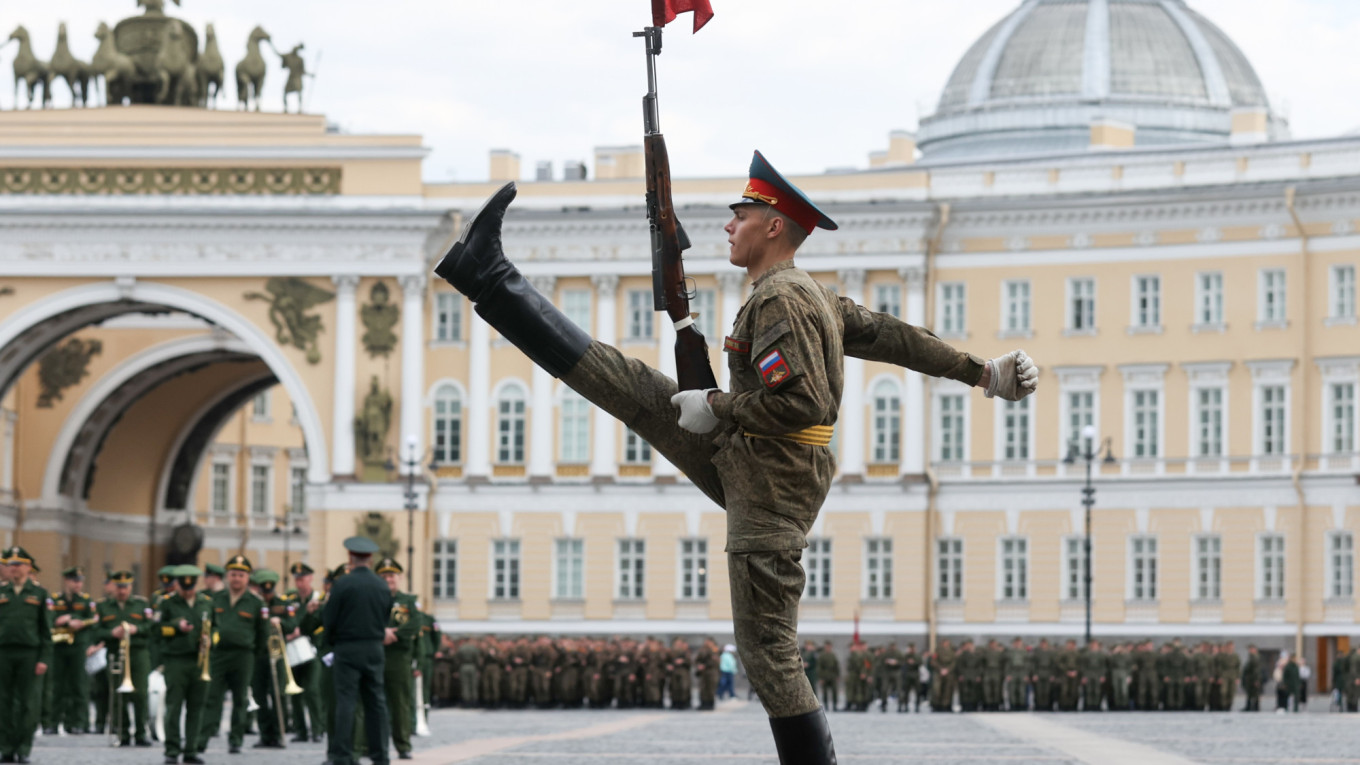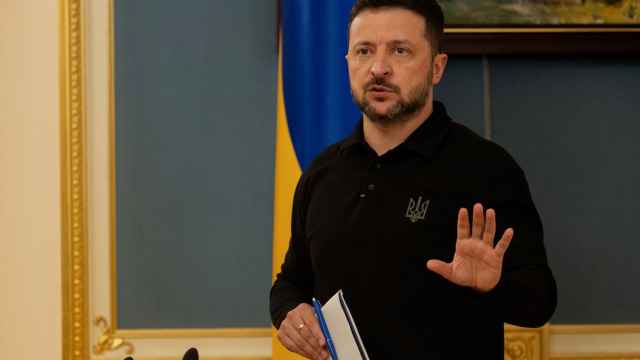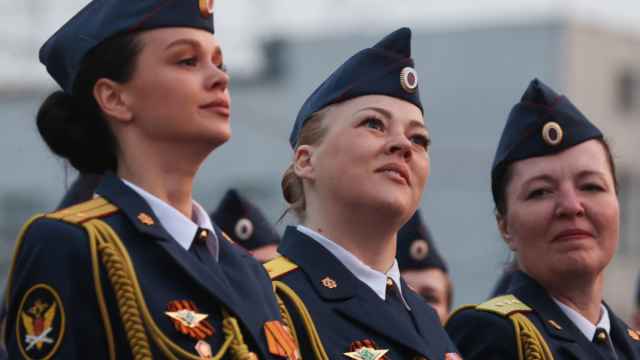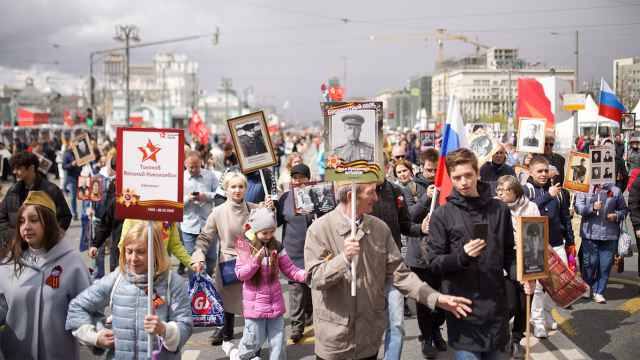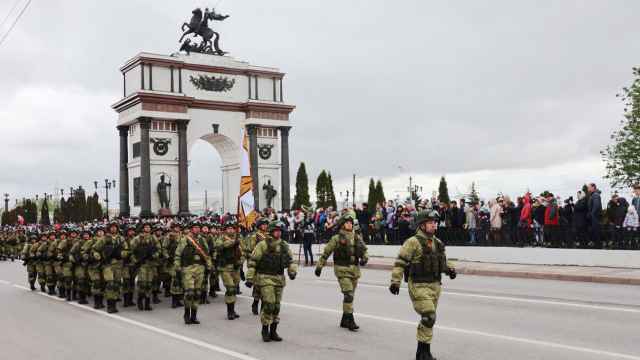Updated with leaders of Armenia, Belarus, Kazakhstan, Kyrgyzstan, Uzbekistan, and Tajikistan planning to attend Russia's Victory Day celebrations.
Russia is due to hold drastically scaled-back Victory Day celebrations Tuesday amid heightened security concerns following last week’s drone attack on the Kremlin and an imminent Ukrainian counteroffensive.
The 78th anniversary of the Soviet Union’s defeat of Nazi Germany in World War II will likely see some of the most modest celebrations of President Vladimir Putin’s two-decade rule.
"The authorities have been trying since the beginning of the Ukraine war to stop the population from feeling that there is actually war going on. And they are still trying to do this,” said Oleg Ignatov, a senior analyst at International Crisis Group.
“But we can see that the notion of normality is gradually collapsing.”
The Kremlin has traditionally used Victory Day — a national holiday — to project an image of military might and to fuel patriotic fervor. But a string of defeats in Ukraine and the expected counter-attack by Kyiv’s forces mean this year’s event — the second since Moscow invaded Ukraine in February 2022 — looks set to be marred by cancellations, enhanced security and little interest in attending from foreign leaders.
Military parades have been canceled in over 20 Russian cities, including several in Siberia, thousands of kilometers from the frontlines. And not a single Immortal Regiment march — held in memory of those killed in World War II and usually attended by millions — will take place.
Dozens of regions have banned the use of drones on Victory Day following strikes on the Kremlin and Russian oil facilities last week, while independent media reports have suggested local deputies in Moscow will be pressed into taking part in “anti-terrorist” patrols.
Putin on Friday discussed preparations for Victory Day with Russia’s Security Council, according to Kremlin spokesman Dmitry Peskov.
In an unusual move, the authorities closed Moscow’s Red Square for two weeks ahead of the May 9 festivities — apparently because of the fears of a possible attack.
“The level of risk and terrorist threat is now higher than ever,” a senior government official who requested anonymity told The Moscow Times.
The military parades that will take place — including the showpiece televised parade on Red Square — will likely include far fewer regular troops and modern equipment than they did before the Russian invasion of Ukraine last year, according to analysts.
While Russia has confirmed the deaths of less than 6,000 soldiers in Ukraine, U.S. officials reportedly believe the real figure is over 40,000.
“Their goal will be to present an image of the Russian army that is healthy and looks ‘normal’ — when in reality, parts of it are severely damaged,” Dara Massicot, a Russian military expert at the U.S.-based RAND Corporation, told The Moscow Times.
She predicted that officials organizing military parades across Russia will be forced to rely on the few military personnel who have not been deployed to Ukraine — including sailors, conscripts completing their compulsory military service, cadets and military instructors.
“It will be harder for regional parades to hide the damage, as most ground forces and VDV [paratrooper] units are deployed to Ukraine,” Massicot said.
Despite the security risks and Kyiv’s looming counteroffensive, Russian officials have said that the parade on Red Square will be comparable in size with last year’s event.
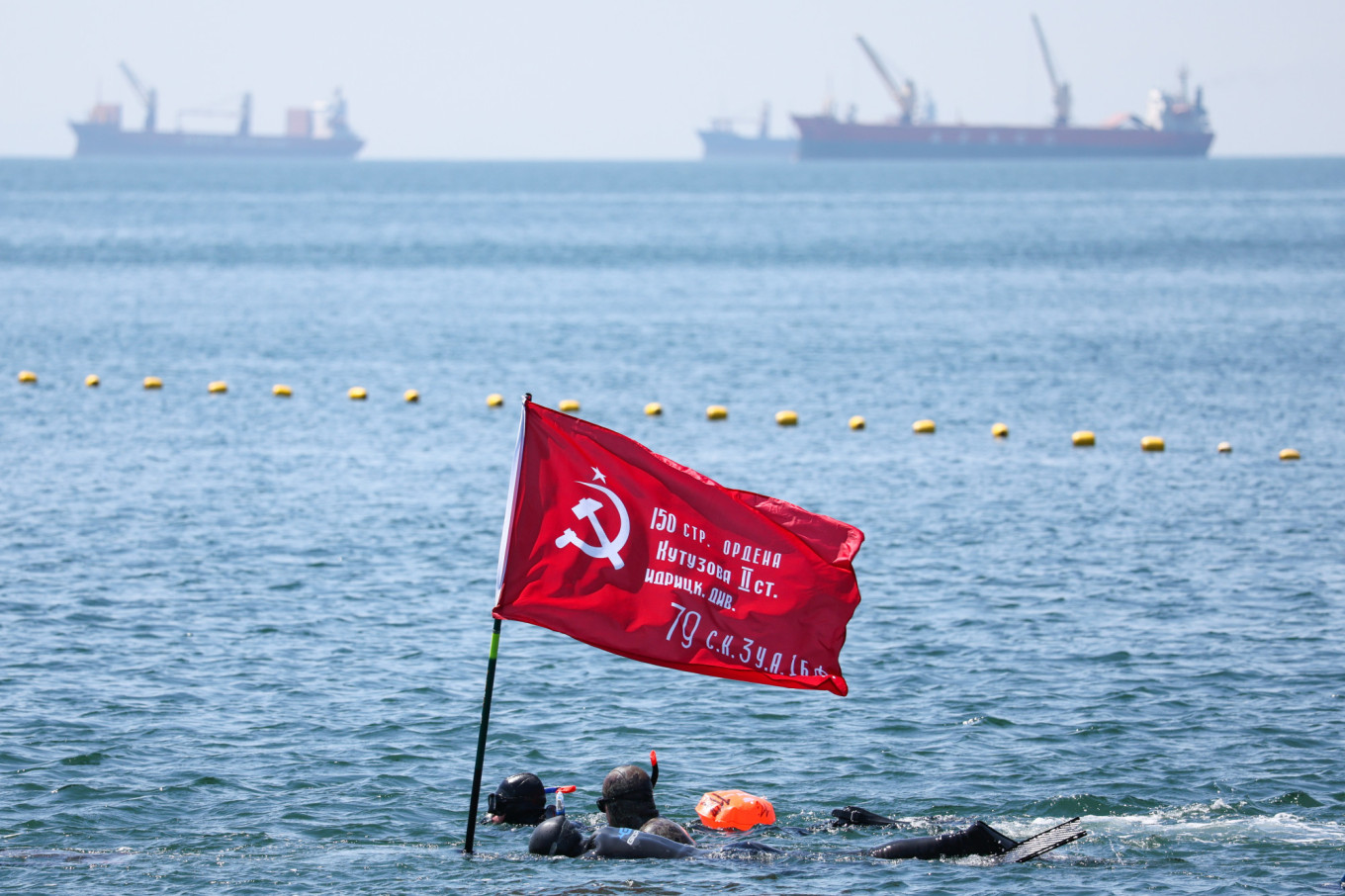
Russian Defense Minister Sergei Shoigu pledged earlier this year that the parade would feature 125 military vehicles and 10,000 personnel.
However, in contrast with years past, only one foreign leader — Kyrgyzstan’s President Sadyr Japarov — gave advance confirmation of their attendance at the celebrations in Moscow.
However, by Monday evening, it had emerged that Kazak President Kassym-Jomart Tokayev, Armenian Prime Minister Nikol Pashinyan, Tajik President Emomali Rahmon, Uzbek President Shavkat Mirziyoyev, and Belarus President Alexander Lukashenko were all planning to attend Tuesday's flagship event on Red Square.
An invitation to Turkmenistan leader Serdar Berdimuhamedov was reported on Monday though it was unclear whether he would be able to attend at such short notice.
Perhaps more significantly, Russia has canceled all Immortal Regiment marches — a popular annual event in which millions of civilians carry placards with photographs of relatives who fought in World War II through Russian cities and towns. The country’s largest march in Moscow was traditionally led by Putin himself.
The decision to cancel these events was made earlier this year following a meeting attended by Sergei Kiriyenko, Putin’s deputy chief of staff, a former Kremlin official told The Moscow Times.
And security concerns were likely not the main factor in the decision to call off the Immortal Regiment, according to the former official.
“The concern in the Kremlin was not about enemy drones,” the former official said.
“They were alarmed that at a march with portraits and photographs … relatives would come with photographs of military personnel killed in the war in Ukraine and it would turn into a mass rally of [bereaved] relatives.”
Analyst Massicot said she also believed Immortal Regiment processions were canceled to prevent “unauthorized outpourings of grief” by families of soldiers killed in Ukraine.
A Russian offensive in eastern Ukraine in recent months has made few significant territorial gains and both sides have suffered heavy casualties, particularly during fierce fighting over the disputed city of Bakhmut.
However, Russian commanders now appear to be switching to defensive mode ahead of the Ukrainian counteroffensive expected this month.
And many observers have linked a series of attacks in Russia last week on oil facilities, railroads and airfields to attempts by Ukraine to disrupt Russian communications and supplies ahead of an attack.
Officials in Kyiv neither confirm nor deny Ukraine’s role in such operations.
The drone strikes — particularly those on the Kremlin — mean the decision to scale down Victory Day celebrations was the right call, according to the senior government official.
“Ukraine has actually chosen the path of sabotage against Russia,” he said.
“The cancellation of the Immortal Regiment was the right decision. First we have to win and then [we can] celebrate.”
Whether the Kremlin’s Victory Day festivities will be marred by fresh Ukrainian attacks or not, the obvious changes to a cherished holiday are likely to be an uncomfortable reminder to ordinary Russians of the spreading fallout from the war in Ukraine.
“The Kremlin is less and less able to pretend that everything is OK,” analyst Ignatov said.
A Message from The Moscow Times:
Dear readers,
We are facing unprecedented challenges. Russia's Prosecutor General's Office has designated The Moscow Times as an "undesirable" organization, criminalizing our work and putting our staff at risk of prosecution. This follows our earlier unjust labeling as a "foreign agent."
These actions are direct attempts to silence independent journalism in Russia. The authorities claim our work "discredits the decisions of the Russian leadership." We see things differently: we strive to provide accurate, unbiased reporting on Russia.
We, the journalists of The Moscow Times, refuse to be silenced. But to continue our work, we need your help.
Your support, no matter how small, makes a world of difference. If you can, please support us monthly starting from just $2. It's quick to set up, and every contribution makes a significant impact.
By supporting The Moscow Times, you're defending open, independent journalism in the face of repression. Thank you for standing with us.
Remind me later.




